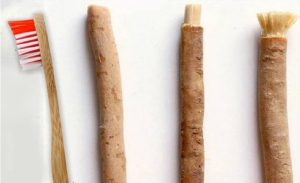
Chewing sticks are commonly used in Jordan, Saudi Arabia and the United Arab Emirates in particular, and the Middle East, Asia, and Africa in general, in addition to many other areas for oral hygiene, religious and social purposes. Recently, the World Health Organisation (WHO) has recommended and encouraged the use of these sticks as an effective tool for oral hygiene. The antibacterial activity of one of these sticks has been tested against some oral aerobic and anaerobic bacteria.
Three methods of antibacterial activity were carried out: streaked plate method, ditch plate method, and tube dilution test for minimum inhibitory concentration (MIC). It was found that the extract of these sticks had a drastic effect on the growth of Staphylococcus aureus ,while a variable effect on other bacterial species was noted. It is concluded that using chewing sticks twice a day on a regular basis may reduce the incidence of gingivitis and possibly dental caries. Apart from their antibacterial activity which may help control the formation and activity of dental plaque, they can be used effectively as a natural toothbrush for teeth cleaning. Such sticks are effective, inexpensive, common, available, and contain many medical properties.


